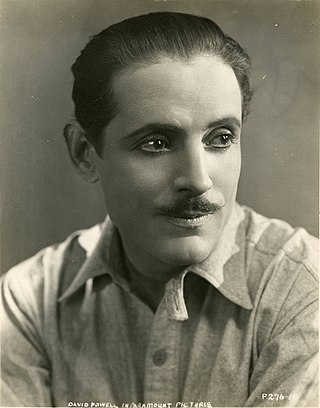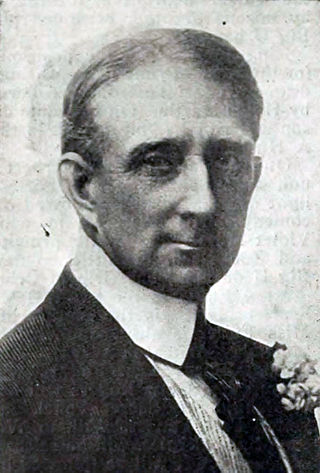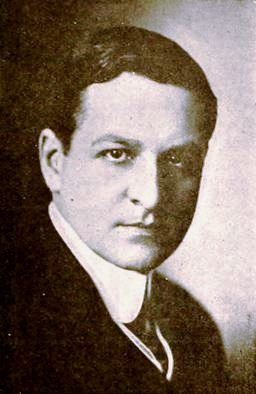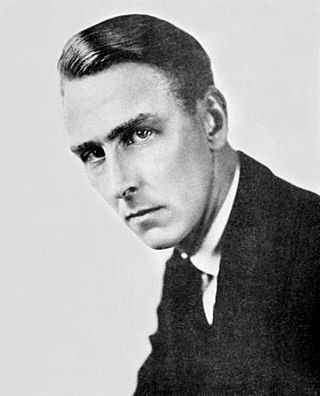
Frank William George Lloyd was a British-born American film director, actor, scriptwriter, and producer. He was among the founders of the Academy of Motion Picture Arts and Sciences, and was its president from 1934 to 1935.

Richard Oswald was an Austrian film director, producer, screenwriter, and father of German-American film director Gerd Oswald.

George Fitzmaurice was a French-born film director and producer.

David Powell was a Scottish stage and later film actor of the silent era.
George Berthold Samuelson was a director and film producer.

Billy West was a silent film actor, producer, and director. Active during the silent film era, he is best known as a semi-successful Charlie Chaplin impersonator. Beyond acting, he also directed shorts in the 1910s and 20s, as well as produced films. West ultimately retired in 1935.

Montagu Love was an English screen, stage and vaudeville actor.

Werner Johannes Krauss was a German stage and film actor. Krauss dominated the German stage of the early 20th century. However, his participation in the antisemitic propaganda film Jud Süß and his collaboration with the Nazis made him a controversial figure.

Lloyd Chauncey Ingraham was an American film actor and director.
Maurice Elvey was one of the most prolific film directors in British history. He directed nearly 200 films between 1913 and 1957. During the silent film era he directed as many as twenty films per year. He also produced more than fifty films – his own as well as films directed by others.

Alec B. Francis was an English actor, largely of the silent era. He appeared in more than 240 films between 1911 and 1934.

Frederick Vroom was a Canadian actor of the silent film era. Vroom appeared in more than 70 films between 1912 and 1939, mostly in supporting roles and bit parts. He played featured roles in Buster Keaton's films The Navigator (1924) and The General (1926). He was born in Clementsport, Nova Scotia, Canada and died in Hollywood, California from a heart attack.

Eliot Stannard was an English screenwriter and director. He was the son of civil engineer Arthur Stannard and Yorkshire-born novelist Henrietta Eliza Vaughan Palmer. Stannard wrote the screenplay for more than 80 films between 1914 and 1933, including eight films directed by Alfred Hitchcock. He also directed five films. During the early 1920s, he worked on most of the screenplays for the Ideal Film Company, one of Britain's leading silent film studios.

Charles Hutchison was an American film actor, director and screenwriter. He appeared in more than 40 films between 1914 and 1944. He also directed 33 films between 1915 and 1938. Though he directed numerous independent silent features, he is best remembered today as Pathé's leading male serial star from 1918 to 1922. In 1923 he went to Britain and made two films Hutch Stirs 'em Up and Hurricane Hutch in Many Adventures for the Ideal Film Company. He made one last serial in 1926, Lightning Hutch, for distribution by the Arrow Film Corporation. It was meant to be a comeback vehicle, but the production company went into bankruptcy just as it was released.

Percy Marmont was an English film actor.
The Life Story of David Lloyd George is a 1918 British silent biopic film directed by Maurice Elvey and starring Norman Page, Alma Reville and Ernest Thesiger. The film "is thought to be the first feature length biopic of a contemporary living politician". Finished in 1918, it was not shown publicly until 1996.
Hepworth Picture Plays was a British film production company active during the silent era. Founded in 1897 by the cinema pioneer Cecil Hepworth, it was based at Walton Studios west of London.

Selznick Pictures was an American film production company active between 1916 and 1923 during the silent era.
The W. W. Hodkinson Corporation was a film distribution corporation active during the silent era. It was established and run by the pioneer William Wadsworth Hodkinson who had previously been instrumental in the foundation of Paramount Pictures. After being forced out from Paramount in 1916, Hodkinson briefly worked with Triangle Film before setting up his own independent distribution outfit in November 1917, purchasing Triangle's distribution network of film exchanges for $600,000. It distributed more than a hundred films from 1918 until 1924, sometimes through Pathe Exchange.
Arrow Film Corporation was an American film production and distribution company during the silent era from 1915 to 1926. An independent company it operated alongside the established studios. Originally formed to supply films for Pathé Exchange, the company quickly separated and concentrated on a mixture of medium and low-budget productions. The company was sometimes referred to as Arrow Pictures.













